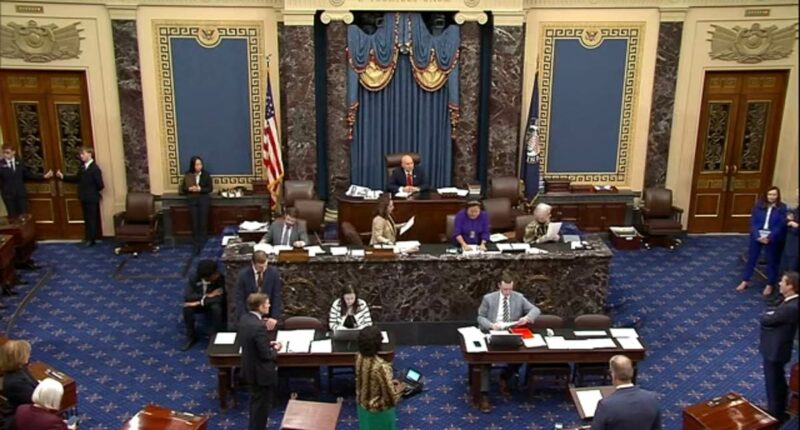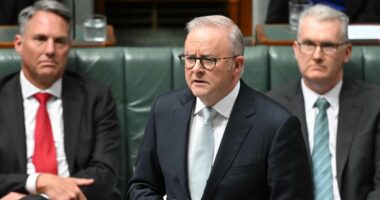Share this @internewscast.com
The U.S. Senate took a significant step on Monday night to conclude the longest government shutdown in history. This decision followed an agreement brokered by a faction of Democrats, going against their leader Chuck Schumer.
The proposed bill now moves to the House of Representatives, which could reconvene in Washington as early as Wednesday to cast their votes on the matter.
The Senate’s decision passed with a 60-40 vote, meeting the exact threshold required to overcome a filibuster and advance the legislation.
President Donald Trump has expressed his endorsement of the measure, commenting on Monday that “we’re going to be opening up our country very quickly.” The Daily Mail has contacted the White House for further remarks.
Discussion on the bill commenced shortly after nightfall, with Senate Majority Leader John Thune orchestrating a series of procedural votes. He expressed optimism that the final passage would take “hours, not days.”
House Speaker Mike Johnson has urged lawmakers to begin returning to Washington immediately, considering travel delays caused by the shutdown. However, he stated that an official notice for the House’s return would be issued only after the Senate finalizes the legislation.
‘We have to do this as quickly as possible,’ Johnson said at a news conference. He has kept the House out of session since mid-September, when the House passed a bill to continue government funding.
After weeks of negotiations, the moderate Senate Democrats agreed to reopen the government without a guaranteed extension of health care subsidies, angering many in their caucus who have demanded that Republicans negotiate with them on the Affordable Care Act tax credits that expire January 1.

The US Senate began a series of votes to end the record-setting government shutdown on Monday night following a deal made by a group of Democrats against leader Chuck Schumer

The vote passed by a 60-40, achieving the minimum number of votes to pass and avoid the filibuster
Thune promised a mid-December vote on the subsidies, but there was no guarantee of success.
In a possible preview, the Senate voted 47-53 along party lines Monday not to extend the subsidies for a year. Majority Republicans allowed the vote as part of a separate deal with Democrats to speed up votes and send the legislation to the House.
A group of three former governors – New Hampshire Sen. Jeanne Shaheen, New Hampshire Sen. Maggie Hassan and Independent Sen. Angus King of Maine – broke the six-week stalemate on Sunday when they agreed to vote to advance three bipartisan annual spending bills and extend the rest of government funding until late January.
Senate Democratic leader Chuck Schumer of New York has voted against moving ahead with the package, along with most of his Democratic colleagues.
The legislation includes a reversal of the mass firings of federal workers by the Trump administration since the shutdown began on October 1.
It also protects federal workers against further layoffs through January and guarantees they are paid once the shutdown is over.
In addition to Shaheen, King and Hassan, Democratic Senator Tim Kaine of Virginia, home to tens of thousands of federal workers, also voted in favor of moving forward on the agreement.
Illinois Senator Dick Durbin, the No. 2 Democrat, Pennsylvania Senator John Fetterman and Nevada Senators Catherine Cortez Masto and Jacky Rosen also voted yes.

President Donald Trump has signaled support for the bill, saying Monday that ‘we´re going to be opening up our country very quickly’

US Senate Majority Leader John Thune
The moderates had expected a larger number of Democrats to vote with them as 10-12 Democratic senators had been part of the negotiations.
But in the end, only five switched their votes – the exact number that Republicans needed. King, Cortez Masto and Fetterman had already been voting to open the government since October 1.
The agreement includes bipartisan bills worked out by the Senate Appropriations Committee to fund parts of government – food aid, veterans programs and the legislative branch, among other things.
Schumer, who received blowback from his party in March when he voted to keep the government open, said he could not ‘in good faith’ support it after meeting with his caucus for more than two hours on Sunday.
‘We will not give up the fight,’ Schumer said, adding that Democrats have now ‘sounded the alarm’ on health care.
Independent Senator Bernie Sanders of Vermont, who caucuses with the Democrats, said giving up the fight was a ‘horrific mistake.’
Senator Chris Murphy of Connecticut agreed, saying that voters who overwhelmingly supported Democrats in last week’s elections were urging them to ‘hold firm.’
House Democrats swiftly criticized the Senate.
Texas Representative Greg Casar, the chairman of the Congressional Progressive Caucus, said a deal that doesn´t reduce health care costs is a ‘betrayal’ of millions of Americans who are counting on Democrats to fight.
Others gave Schumer a nod of support. House Democratic leader Hakeem Jeffries had criticized Schumer in March after his vote to keep the government open.
But he praised the Senate Democratic leader on Monday and expressed support for his leadership throughout the shutdown.
‘The American people know we are on the right side of this fight,’ Jeffries said Monday, pointing to Tuesday’s election results.
It´s unclear whether the two parties would be able to find any common ground on the health care subsidies before a promised December vote in the Senate.
House Speaker Mike Johnson has said he will not commit to bringing it up in his chamber.
On Monday, Johnson said House Republicans have always been open to voting to reform what he called the ‘unaffordable care act’ but again did not say if they would vote on the subsidies.
Some Republicans have said they are open to extending the COVID-19-era tax credits as premiums could skyrocket for millions of people, but they also want new limits on who can receive the subsidies and argue that the tax dollars for the plans should be routed through individuals.
Other Republicans, including Trump, have used the debate to renew their yearslong criticism of the law and called for it to be scrapped or overhauled.

















